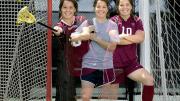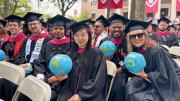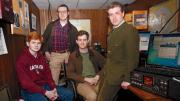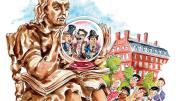Melanie Baskind ’12 stands five feet, three inches, tall, “but I look younger than I am,” she says. “So people think I’m five-one.” Whatever the reason, it’s a mistake to underestimate her stature, especially on the playing fields, where Baskind is a modern rarity—a two-sport varsity athlete who excels in both soccer and lacrosse. “Excels” might be an understatement: last fall, the Ivy League unanimously named Baskind its Player of the Year in women’s soccer after a season in which the Crimson forward tied for the league scoring lead and spearheaded her team to an Ancient Eight title. The previous spring, the midfielder was First Team All-Ivy in lacrosse. As a senior, she has co-captained both Harvard squads, and is now in her second year as lacrosse captain.
Baskind is a full-blooded athlete. Her Quincy House suite of 12 roommates includes nine varsity players plus an Ultimate Frisbee captain. Her mother, Dianne, still plays soccer and her father, Carl, basketball; both are over 50. (Her mother’s family runs an ice-hockey shop in upstate New York.) Older sister Julie played club lacrosse at Michigan. And in high school in Framingham, Massachusetts, Baskind was so outstanding in both soccer and lacrosse that the Boston Globe named her its secondary-school female athlete of 2008.
Baskind likes multiple sports partly because she appreciates having “that many more days of competition.” She does not see the two-sport path as a disadvantage: “I never want to hear someone say, ‘She had a bad soccer season because she played lacrosse,’ or vice versa,” she says; instead, she finds a synergy between the two. “My soccer coach [Ray Leone] tells me that he likes seeing me play defense in lacrosse, and wants me to bring some of that to soccer,” she notes. “And in lacrosse, our coach [Lisa Miller] is always making side remarks to me like, ‘I’m sure this is the same in soccer.’ ”
Switching to a different kind of ball also means “You don’t get bored with the sport,” Baskind explains. “Mentally, it gives you an edge because you’re so excited to return after playing something else. Physically, it’s healthy because you are building certain muscle groups and giving other ones a rest. That’s made me a better player. Lots of things transfer from one sport to the other—three-on-two situations, transition opportunities, and just understanding the positional aspects of the game: the way you use peripheral vision, how you see the field, is transferable knowledge.”
There may be a nascent drift at Harvard toward two-letter women. Four of Baskind’s lacrosse teammates also play field hockey, and a soccer cohort swims for the water-polo squad. Ivy League rules, which limit practices and off-season play days, make dual citizenship more manageable. “More people are doing it recently,” Baskind says. One reason might be head women’s lacrosse coach Lisa Miller, now in her fifth season. Miller came to Harvard from Syracuse, where she prospered with two-sport athletes; she strongly supports the multisport option. “It’s good for kids to have different teachers,” Miller says. “Every coach has a personal style and it helps them to hear the same—and different—messages from various coaches.”
Lacrosse and soccer have similarities—two teams, each trying to get a ball past a goalie and into the opponents’ goal—but there are distinctions, too, beyond the matter of lacrosse sticks. The lacrosse field has lines that clearly separate offensive from defensive play, and when a midfielder crosses such a line she switches from one to the other. The soccer pitch has no such hard lines, so offense and defense often mingle. Both sports include lots of running, but “you get more long sprints as a midfielder in lacrosse,” says Baskind. “Soccer is more endurance running. You’re changing direction a lot—there are more turnovers. You might have the ball for only a few seconds in soccer; it’s pretty common to switch back and forth. In general, lacrosse has longer possessions.”
Many talents make Baskind a dominant athlete, though speed is her most obvious gift. “I’m quicker than I am fast,” she says, meaning that her first steps—as she accelerates from zero—are especially snappy. This helps her be first, for example, to pounce on a loose ball. Less tangible skills include leadership ability and the plain fact that, as she says, “I’m an intensely committed person.” Lisa Miller notes that one of Baskind’s assets is “her sense of humor. She can make me laugh at a tough spot in a game, and can make her teammates laugh, too. That’s probably one reason she was elected captain so early [as a junior]. Melanie also has a knack for making big plays at critical times—like scoring game-winning goals.”
A neurobiology concentrator, Baskind plans a career in medicine; if given the opportunity, she’d like to get to Africa next year. Meanwhile, she has some lacrosse to play. Harvard, which dominated the Ivies in women’s lacrosse from 1980 until 1993, has not captured the league title since then, though under Miller the program has moved up from sixth place to fifth to a tie for third in 2011. (With Penn, Princeton, Dartmouth, and Harvard ranked in the top 20 in Inside Lacrosse’s preseason poll, the league is a strong conference.) The Crimson lost to Princeton, 12-10, in the Ivy tournament final last spring, with Baskind making the All-Tournament team.
She’d like to graduate as a double champion. Given her endowment of talent, commitment, and competitiveness, and her track record as a teammate, don’t bet against it.









